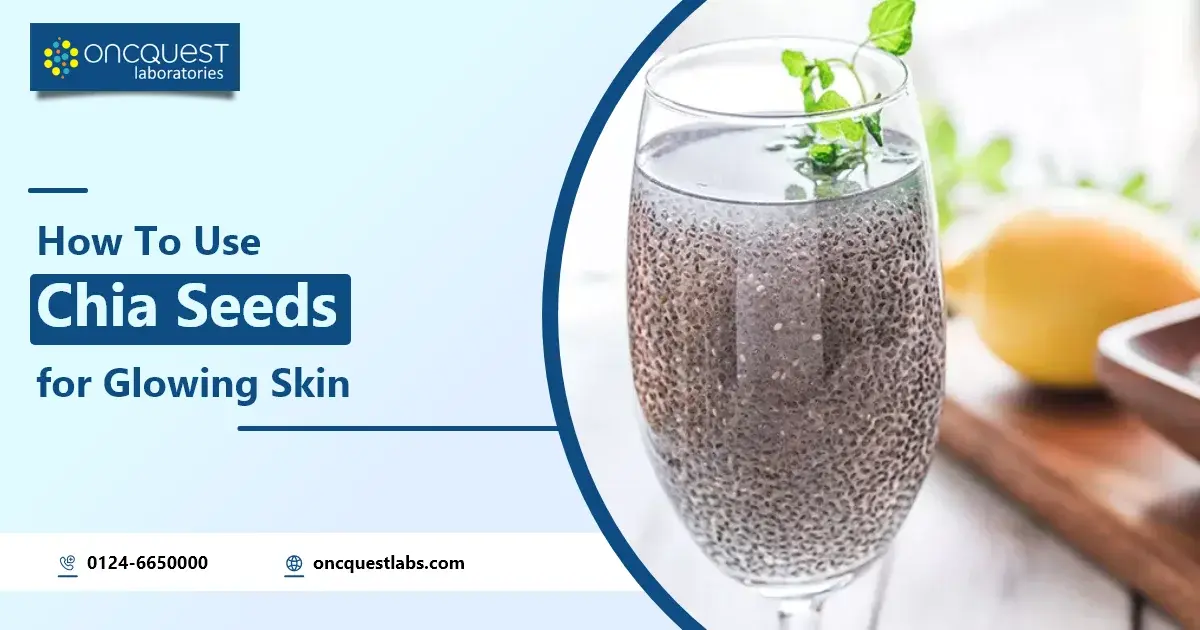Chia seeds, derived from the plant Salvia hispanica, have been used for centuries as a food source, dating back to ancient civilizations such as the Aztecs and Mayans. Known for their dense nutritional profile, chia seeds are packed with omega-3 fatty acids, antioxidants, vitamins, and minerals. These tiny seeds can significantly contribute to skin health when incorporated into both diet and skincare routines.
Omega-3 fatty acids in chia seeds help to keep the skin hydrated, reduce inflammation, and protect against sun damage. Antioxidants fight free radicals, which are responsible for premature aging, while the vitamins and minerals nourish the skin, promoting a healthy and radiant complexion.In this guide, we will explore various ways to harness the benefits of chia seeds for glowing skin, including dietary tips, DIY skincare recipes, and practical advice for integrating chia seeds into your daily routine. By the end of this guide, you will have a comprehensive understanding of how chia seeds can enhance your skin’s health and appearance naturally.
Contents
Nutritional Value of Chia Seeds
Chia seeds are a nutritional powerhouse, offering a rich array of essential nutrients in a small package. A typical serving of chia seeds, which is about two tablespoons (28 grams), contains approximately 140 calories, 11 grams of fiber, 4 grams of protein, and 9 grams of fat, with a significant portion of these fats being omega-3 fatty acids, particularly alpha-linolenic acid (ALA). These healthy fats are crucial for maintaining cellular health and reducing inflammation. Chia seeds are also an excellent source of antioxidants, which protect the body from oxidative stress and contribute to healthier skin. Additionally, they provide a variety of essential vitamins and minerals, including calcium, magnesium, phosphorus, and zinc. Calcium and magnesium are vital for bone health, while phosphorus plays a key role in energy production and cellular function. Zinc is essential for immune function and skin health. Furthermore, chia seeds are gluten-free and can be easily incorporated into various diets, making them a versatile addition to meals. This impressive nutritional profile makes chia seeds a valuable food for promoting overall health and well-being.
How to Use Chia Seeds for Glowing Skin
Smoothies
Adding chia seeds to your smoothies is a quick and easy way to boost your skin health. Simply add one to two tablespoons of chia seeds to your favorite smoothie recipe. The seeds will blend seamlessly, adding a nutritious boost without altering the taste significantly.
Chia Seed Pudding
Chia seed pudding is a delicious and nutritious option for breakfast or a snack. Mix three tablespoons of chia seeds with one cup of milk (dairy or plant-based) and let it sit overnight in the refrigerator. In the morning, you’ll have a creamy pudding that can be topped with fruits, nuts, or honey for added flavor and nutrients.
Salads and Dressings
Sprinkle chia seeds over your salads to add a crunchy texture and nutritional boost. You can also mix chia seeds into your salad dressings. Simply add a tablespoon of chia seeds to your favorite dressing recipe and let it sit for a few minutes to thicken.
Baked Goods
Incorporate chia seeds into your baking recipes. Whether you’re making muffins, bread, or energy bars, adding chia seeds can enhance the nutritional value of your baked goods. Replace a portion of the flour with ground chia seeds or sprinkle whole chia seeds into the batter.
Topical Applications of Chia Seeds
Chia Seed Face Mask
Create a hydrating and soothing face mask using chia seeds. Mix two tablespoons of chia seeds with one cup of water and let it sit for 15-20 minutes until it forms a gel. Apply the gel to your face and leave it on for 10-15 minutes before rinsing off with warm water. This mask helps to hydrate the skin, reduce inflammation, and promote a radiant complexion.
Chia Seed Oil
Chia seed oil is packed with nutrients that nourish the skin. Apply a few drops of chia seed oil to your face and gently massage it into your skin. This oil can help to moisturize, reduce redness, and improve skin elasticity. It’s best used as part of your nighttime skincare routine.
Exfoliating Scrub
Create a gentle exfoliating scrub by mixing chia seeds with a natural exfoliant like honey or yogurt. Combine one tablespoon of chia seeds with two tablespoons of honey or yogurt and gently massage the mixture onto your face in circular motions. Rinse off with warm water. This scrub helps to remove dead skin cells, unclog pores, and leave your skin feeling soft and smooth.
Benefits of Chia Seeds for Skin
Hydration
Chia seeds are highly effective at retaining moisture, making them an excellent natural remedy for keeping the skin hydrated. When soaked in water, chia seeds form a gel-like substance due to their high soluble fiber content. This gel can be applied topically to the skin or consumed to help maintain internal hydration. Proper hydration is essential for maintaining skin elasticity, preventing dryness, and giving the skin a plump, youthful appearance.
Anti-Aging Properties
Chia seeds are rich in antioxidants, including chlorogenic acid, caffeic acid, and flavonoids. These antioxidants combat free radicals, which are unstable molecules that cause oxidative stress and contribute to the aging process. By neutralizing free radicals, chia seeds help to reduce the appearance of fine lines, wrinkles, and age spots. Additionally, the high levels of omega-3 fatty acids in chia seeds promote the production of collagen, a protein that maintains the skin’s structure and elasticity, further reducing signs of aging.
Anti-Inflammatory Effects
The omega-3 fatty acids found in chia seeds, particularly alpha-linolenic acid (ALA), have powerful anti-inflammatory properties. These fatty acids help to reduce inflammation in the skin, which can be beneficial for conditions such as acne, eczema, and psoriasis. By decreasing inflammation, chia seeds help to soothe redness and irritation, promoting a calmer, clearer complexion.
Protection Against Environmental Damage
Chia seeds can help protect the skin from environmental damage caused by factors such as UV radiation and pollution. The antioxidants in chia seeds, including quercetin and kaempferol, provide a protective barrier that shields the skin from harmful UV rays and environmental toxins. This protection helps to prevent premature aging, hyperpigmentation, and skin damage.
Enhanced Skin Barrier Function
The essential fatty acids in chia seeds support the skin’s barrier function, which is crucial for keeping out harmful substances and retaining moisture. A strong skin barrier prevents transepidermal water loss (TEWL), ensuring that the skin remains hydrated and healthy. This barrier function is especially important for individuals with dry or sensitive skin, as it helps to maintain a balanced and resilient complexion.
Potential Side Effects and Precautions
While chia seeds offer numerous health benefits, it is important to be aware of potential side effects and take necessary precautions to ensure their safe consumption and use.
Allergic Reactions
Although rare, some individuals may experience allergic reactions to chia seeds. Symptoms of an allergic reaction can include itching, rash, hives, swelling, and difficulty breathing. If you have a known allergy to similar foods such as sesame or mustard seeds, exercise caution when trying chia seeds for the first time. If any signs of an allergic reaction occur, discontinue use immediately and seek medical attention.
Digestive Issues
Chia seeds are high in fiber, which can sometimes lead to digestive issues, especially if consumed in large quantities or by individuals who are not accustomed to a high-fiber diet. Common symptoms include bloating, gas, and abdominal discomfort. To minimize these effects, it is advisable to start with a small amount of chia seeds and gradually increase the intake, allowing your digestive system to adjust. Additionally, ensure you drink plenty of water when consuming chia seeds to help the fiber move smoothly through the digestive tract.
Potential for Choking
When chia seeds are consumed dry, they can absorb a significant amount of liquid and expand. This property can pose a choking hazard if the seeds are not properly hydrated before consumption. To avoid this risk, always soak chia seeds in water or another liquid for at least 10-15 minutes before eating. This allows the seeds to expand and form a gel-like consistency, making them safer to swallow.
How to Incorporate Chia Seeds into Your Diet for Glowing Skin
Incorporating chia seeds into your diet for glowing skin is simple and versatile. Start by adding a tablespoon or two of chia seeds to your daily meals to reap their skin-nourishing benefits. They can be easily mixed into smoothies, providing a boost of omega-3 fatty acids and antioxidants to enhance skin hydration and reduce inflammation. Chia seed puddings are another delicious option; soak the seeds in your favorite milk or plant-based alternative overnight, and enjoy a creamy, nutrient-rich breakfast that promotes a radiant complexion. You can also sprinkle chia seeds over salads, yogurt, or oatmeal to add a crunchy texture and extra fiber, aiding in digestion and detoxification, which are essential for clear, glowing skin. Baking with chia seeds is another excellent method; incorporate them into muffins, breads, or energy bars to increase your intake effortlessly. By regularly including chia seeds in your diet, you’ll provide your skin with the essential nutrients it needs to stay healthy, hydrated, and glowing.
Conclusion
Chia seeds are a powerful addition to any diet and skincare routine, offering a myriad of benefits for achieving and maintaining glowing skin. Their rich nutritional profile, including omega-3 fatty acids, antioxidants, fiber, and essential vitamins and minerals, supports skin hydration, reduces inflammation, and combats signs of aging. Whether consumed in smoothies, puddings, or salads or used topically in homemade masks and scrubs, chia seeds can enhance your skin’s health and appearance. By incorporating chia seeds into your daily regimen, you can enjoy a natural, holistic approach to achieving radiant, healthy skin.
FAQ
How many chia seeds should I consume daily for glowing skin?
It’s generally recommended to consume about one to two tablespoons (15-30 grams) of chia seeds per day to enjoy their skin benefits.
Can I apply chia seeds directly to my skin?
Yes, chia seeds can be used in DIY skincare recipes such as face masks and scrubs. Soaking them in water or mixing with other natural ingredients like honey or yogurt can create a nourishing treatment for the skin.
How long does it take to see results on my skin from consuming chia seeds?
The time it takes to see noticeable improvements can vary depending on individual factors like diet, skin type, and overall health. Generally, consistent use over a few weeks can lead to visible results.
Are there any side effects of consuming chia seeds?
While chia seeds are generally safe, they can cause digestive issues like bloating or gas if consumed in large quantities or by those not used to high fiber intake. It’s important to start with small amounts and increase gradually.
Can chia seeds help with acne?
Yes, the anti-inflammatory properties of omega-3 fatty acids in chia seeds can help reduce acne and skin inflammation. Their high fiber content also aids in detoxifying the body, which can further contribute to clearer skin.





